- Home
- L. R. Patton
The Fiery Aftermath
The Fiery Aftermath Read online
Table of Contents
Title Page
The Aftermath: Episode 5 (Fairendale, #5)
Time
Rider
Soon
Battle
Unexpected
Father
House
Promise
Search
Flight
Night
The End
Don’t miss out on the next Fairendale adventure!
A Short History of the Weeping Woods
Survival Skills of the Fittest
A One-Sided Conversation with a Parent in Fairendale
About the Author
A Note From L.R.
Read all the books in the Fairendale series!
Book .5: The Good King’s Fall (a prequel)
Book 1: The Treacherous Secret
Book 2: The King’s Pursuit
Book 3: The Perilous Crossing
Book 4: The Dragons of Morad
Book 5: The Fiery Aftermath
Book 6: The Mysterious Separation
Collector’s Editions:
Books 1-6: The Flight of the Magical Children
To see all the books L.R. Patton has written, please click or visit the link below:
www.lrpatton.com/store
BATLEE Press
PO Box 591596
San Antonio, TX 78259
Copyright ©2016 by L.R. Patton. All rights reserved.
No part of this book may be reproduced or transmitted in any form or by any means, electronic or mechanical, including photocopying and recording, or by any information storage and retrieval system, without permission in writing. I appreciate your taking the time to read my work. Please consider leaving a review wherever you bought it, or telling your friends how much you enjoyed it. Both of those help spread the word, which is incredibly important for authors. Thank you for supporting my work.
www.lrpatton.com
This is a work of fiction. Names, characters, places and incidents are either the product of the author’s imagination or are used fictitiously, and any resemblance to actual persons, living or dead, business establishments, events or locales is entirely coincidental.
Printed in the United States of America
First Edition—2016/Cover designed by Toalson Marketing
www.toalsonmarketing.com
To the ones
who are brave enough
to try
Time
CORA stands in the middle of the village, staring at the houses around her, wondering how many of them are still inhabited and how many have been abandoned, now that she has begun making her plans, now that she has called the people to action, now that she has put the idea in their heads. She wonders how many of the village people are cowards, like her father was, how many of them must have stolen away in the dark of night so they will not have to join the dangerous quest to release the children, though the villagers are still only in the strengthening time of the plan and have quite some way to go before the attacking time. But they know what is coming. They have seen her plans, after all.
It is late afternoon, and not a soul has stepped from their houses, though there is plenty to see.
Cora looks up. Flames draw closer. She watches them leap toward the sky and then die back down. The woods have begun burning, those Weeping Woods that have not seen a burning like this one since King Sebastien stole Fairendale’s throne. She has heard of that burning in stories, the burning done by the dragons, after which all the trees magically lived and soon bore their green once more, but, for a time, wore their black like mourning rags. That is, in fact, why the woods are called the Weeping Woods. And now it is burning again. Because of dragons. It was said that the dragons did not remain in the land after the Great Battle, but Cora knows they did, for she knows many things others do not.
Cora feels a smile playing at the corners of her lips.
Yes. She knows they remain.
In the case of dragons awakening, perhaps she will not be the only one to wage war against the castle. Perhaps the people of Fairendale will have the unlikeliest of allies—dragons that people have not seen for far too long.
The first time she saw a dragon was long ago, when she flew the sky wearing her second skin. No one could do transformation the way she could. Shape shifting was not the normal way of magic, of course. It was only the way of dark magic joining with the light, a magic gift bestowed on only a few at birth. She could control both. Not many could, which is why the realm was not said to be home to many shape shifters. She had done it often as a girl, but, alas, her daughter had not inherited the gift.
Perhaps Mercy would be alive now if she had.
Cora, when a girl, would soar over the dragon lands, but the dragons stayed well hidden from an untrained eye. She caught sight of one only once. Its eyes followed her movements, and she had wondered, momentarily, if dragons feasted on birds or whether she was too small a target to even bother with the chase. The dragon must have thought so, for he let her be, and she never ventured over the dragon lands again. They were too dangerous.
But perhaps the people will see dragons again. Perhaps the people will be able to live in harmony with the dragons, as they had done in King Brendon’s day. Perhaps she and the rest of the people can restore Fairendale to its former glory. She had never, in truth, seen the kingdom in its former glory, for she was not born in the days of King Brendon. But the stories tell of its beauty.
Cora hears a door open on one of the houses behind her. She turns. A man steps from it. The baker. She thought surely he had left, since she had seen no movement since the day she had called them all inside the secret underground chamber that lies beneath the village fountain and laid out her plans. Yet he is still here. He does not see her, though. His face is turned toward the woods.
Another door opens. An old woman emerges. She looks at Cora, and then she looks toward the woods. Another and another and another step from their homes, more than Cora thought possible, and they all stand in the streets with their faces toward the woods.
It burns at an alarming rate. The trees set off a great light, greater even than the day, for the sun is nowhere to be found. The heat curls over them and warms them better than their threadbare blankets. They are, perhaps, glad for this fire, for they do not have to shiver as they have done all night.
The people stand watching, in a silence that is heavier than the day’s sky. And then Cora says, “Dragons,” and the people look at her. They widen their eyes. She sees their fear. So she laughs. “There is no need to be afraid,” she says. “They will not hurt us. Their quarrel is with the castle, not with us.”
The people do not question how Cora might know something such as this. They would not believe her, of course, if she were to tell them. They would not believe that she had worn the feathers of a bird moments before she stood in the middle of the streets, for Cora has a magical child. Cora passed her magic on. Cora should have nothing left.
But what many people do not know about shape shifters is that their shape-shifting magic remains with them, though they can do no other magic. So it is that Cora, at the first sight of flame, donned her animal robe and took to the sky. She saw the great multitude of dragons. She saw the king’s men, fallen throughout the land. She saw the dead horses.
She did not, however, see any children.
The king’s men, it seems, crossed too far into the dragon lands. Cora feels the triumph warming her throat as the fire draws near enough to warm her face. The dragons will come for the king, if fortune remains on the side of the people.
And if the dragons do not come, the castle will be without its guard. It will be vulnerable. It will be all too easy to steal inside and release the children.
Cora turns to the villagers. “People of Fairendale,” she says. They look at her, their eyes no longer fearful. “The king’s men have perished.” She waves toward the flames, flickering closer. “Because of the dragons.” Once again, no one questions how she knows information like this. Cora has always been an outcast among the people, for she was known to have deep, dark magic back when she was a girl. And it is true that she passed that magic on to her daughter, and her daughter had no trouble making friends here. But let us not dwell on that. Let us see Cora, as she stands today, the wind flapping through her blood-red hair, whipping it about her face. She brushes it aside, so the people might see the glow of her green eyes.
A woman, you see, does not need friends to lead. She merely needs authority. And this woman’s words, her way of speaking, give her authority.
Cora smiles at all the people, who seem to have handed her their blind trust now. It was not always so. Perhaps it takes great tragedy to show people what needs doing. So there is some good that comes from evil. Perhaps one merely has to look in the right place to find the good.
“What this means for us,” Cora says, “is that the castle is vulnerable.”
The people murmur around her, as if understanding, now, what she means and what they must do. And then the baker, good man, grins at her. “So what shall we do?” he says, though it is plain to see that he knows.
“We shall attack,” Cora says. “Tomorrow night.”
“And what of this night?” a man from the back calls out. “Will the king not be most vulnerable tonight?”
“Let the king feel his fear,” Cora says. “Let him feel his vulnerability. Let it shake his bones and keep him from his sleep.” Cora breathes long and deep. “And then we shall attack.”
The people nod. She is respected now as their leader, for no one else took it upon themselves to do what she has done. They will do anything she says now.
“Tonight,” Cora tells them, “we shall meet in the secret chamber, and we shall make our plans.”
“But what of the fire?” a woman says. The people lift their eyes toward the blaze.
Cora stares at it, too. The fire did not touch the village last time. It will not touch it now. “We need not worry,” Cora says. “It will give us warmth for a time. We must permit it.” For she knows, dear reader, that there are colder days ahead.
So the people file back inside their houses to watch the burning from their windows, for the air outside is full of death and smoke and silence.
Cora remains in the street. She lifts her face to the sky, roiling with clouds that are not clouds at all, and lifts her hands to the warmth. The hot breath hits her face, and she remembers, now, the words that an old prophetess told her once upon a time. Fire, the prophetess had said, is sometimes needed to clear away unnecessary pieces and reveal what lies within.
So she watches the fire burn, unafraid of its wrath.
“So,” the great dragon Zorag says. He stands on top of a mountain, at the mouth of a cave. “So there is you.”
He is the only dragon on this mountain. Except for his cousin, that is, hanging about in the shadows where not even Zorag can see him. Blindell is his name. He is not nearly so massive at Zorag, for he is a young dragon, having lived only about half as long as his cousin and yet longer, now, than his parents.
Arthur, you might be surprised to know, is alive. He is huddled, even now, in this damp cave. He is a prisoner of the dragons, bound by the laws of this land. He is given water and meat and nothing more. The meat the dragons scorch first with a burst of fire from their mouths. It is a source of comic entertainment for them, for they eat meat raw and find it odd that one would eat it blackened. Though one might argue that people do not eat it blackened either. But, alas, this is beyond the understanding of dragons.
“So there is me,” Arthur says. He has not withered as yet. He is not afraid of dragons, for he knew one once. “And what do you want of me?”
He has asked this question of many other dragons, ones who have carried him to water, a small tributary of the Violet Sea that runs through the desert land, in their jaws and then carried him back. But none can answer.
This is the first time he has seen Zorag since the fiery battle last morn. Zorag remains mostly with his dragons, settling them, advising them, ordering them to have patience, for it is not yet the time for attack. They must see what happens next. They must determine whether there is another danger coming for them.
The dragons want nothing more than revenge for the breach of a treaty, agreed upon long ago. Zorag maintains that they have seen their revenge, for not a man lived through the battle. Arthur excepted, of course. Mysteriously, all of the bodies vanished moments ago. Not one of them remains. No one has been able to explain it. But if one were to travel back in time to the days of the Great Battle and, more recently, the Roundup, one would marvel at how very similar these battlegrounds ended up: empty of all bodies and evidence that a battle had ever taken place.
The dragons, too, have been asking about the man Zorag keeps in a cave. Is he a pet? Is he a bargaining chip? Is he their food, for he will not feed many. He is too wispy, they say.
One might agree that one human would not provide much food at all for the fifty-three dragons in this land.
Fifty-three dragons, you might say? How have they remained hidden all these years? Well, you see, dragons, as we have mentioned before, are very good at hiding. Their colors change, blending with their background. When they close their eyes, they nearly disappear altogether.
Truth be told, Zorag does not quite know what he wants of Arthur yet. He only knows that the man reminds him of someone he once knew and loved, a man with a good heart, a man whom he would sometimes carry on his back and take for a flight out in the hills, where they could not be seen by anyone other than the animals of the fields. This is why Zorag has kept Arthur alive. This is why Zorag let the others, whom we know as Maude and the children, go, for he did not lose any of the humans who crossed into his land. He merely turned away.
Zorag, you see, has a good heart. He heard this man’s plea, and he looked on the children, sensing their fear, and because he still remembers the joy he used to feel in the days of old, days when he played with the children of the kingdom freely and they played freely with the dragons, he could not destroy the ones who stood before him. So much as a serpent’s heart can be turned toward pity, so was Zorag’s. In the very moment the king’s men crossed into Morad, Zorag sent the silent message to his dragons, calling for an attack on the king’s men, but adding that they must let the children and the woman go. He had watched the group tear toward a cave on the perimeter of the woods, where he knew they would be safe.
Of course the dragons had known for some time that the man and the woman and all the children were walking about their lands. Zorag had held his people at bay, hoping the intruders would be gone before too very long. Instead, they had brought more intruders.
Zorag grieves for the land. He grieves for the forest. He mostly grieves for all the people who were killed in the battle. This is not the way it is supposed to go. If only the king’s men had remained on their side of the line. If only they had honored the treaty. If only the dragons had let them go.
If he could do it all again, Zorag would have warned the men away. But our kind dragon knows as well as we do: time does not turn back but only marches forward.
And so Zorag stands on the brink of a cave, where a man steps into the fading light.
“I want nothing of you,” Zorag says, looking out across the dragons that now move about freely. For years they have kept their existence a secret. Now they freely roam. There is no need for the secrecy now that the forest burns. Anyone would know it burned because of dragons.
But the dragons cannot roam far enough. Morad, you see, is running out of food. Every night, the one on food duty must journey farther and farther into the other kingdoms to try to find enough sustenance to keep the dragons alive. The dragons grow hungrier
by the day. Zorag has run out of ideas.
“I am here for a reason,” Arthur says. “Am I not?”
Zorag turns away from the dragons and back to Arthur. That face. Unfamiliar. And yet those eyes. He has seen those eyes somewhere before. Long ago, perhaps. “You are here because you broke the treaty.”
“No,” Arthur says. “That is not why I am here.”
And he is right, dear reader, though Zorag cannot point to the exact reason he has kept this man. Perhaps because of the familiar eyes? Perhaps for the purpose of working out a plan to save the dragons, as he had once saved a man? Perhaps to restore the kingdom to what it once was? Could this man be their only hope?
This is dangerous thinking, even for a dragon as powerful as Zorag. Restoring the kingdom will mean war, and his dragons are far too weak for war. The last one...
“What are you called?” Zorag says.
“I am Arthur of Fairendale,” Arthur says.
“Arthur,” Zorag says. “You remind me of someone I once knew.”
“And you remind me of a dragon I once knew,” Arthur says. His voice is genuine, soft. Zorag turns away, back to the dragons. “I knew a dragon once who was brave and kind and fought for the good of the people.”
“I have never fought for the good of the people,” Zorag says, though it is not true. He remembers the battle well, though he does not want to. He lost both his parents in that battle, as had Blindell. And after it, he had taken over the care of his cousin and all the dragons had hidden from the king who did not shudder to slay a dragon.
He would like very much to forget all that. He would like very much to forget that he ever had a rider, that his rider had ever disappeared.
“I think you once loved a rider,” Arthur says, for he can see the sadness drawn upon Zorag’s face.
Zorag growls at him. “You know nothing,” he says.
Arthur dips his head. “I know nothing,” he says. “But I see.” He lifts his head again and stares into Zorag’s eyes. Zorag cannot look away from Arthur, as if Arthur has woven some kind of spell around them, a spell where Zorag can hear the voice of his past calling to him, begging him for help. Is Arthur reading his mind? Does he have that kind of magic? It is impossible to tell.

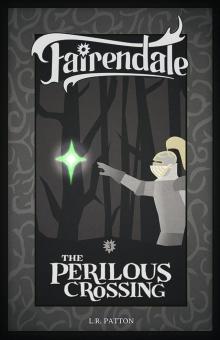 The Perilous Crossing
The Perilous Crossing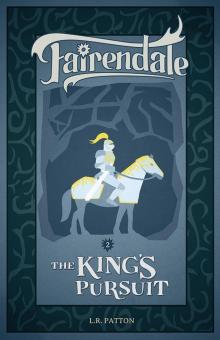 The King's Pursuit
The King's Pursuit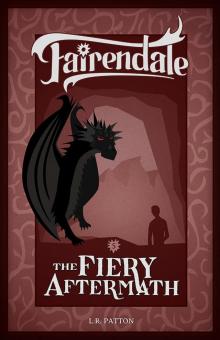 The Fiery Aftermath
The Fiery Aftermath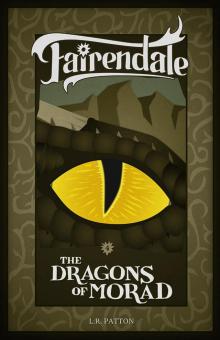 The Dragons of Morad
The Dragons of Morad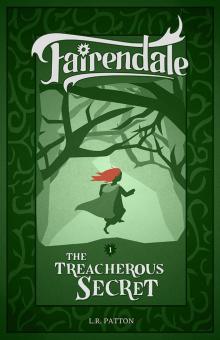 The Treacherous Secret
The Treacherous Secret